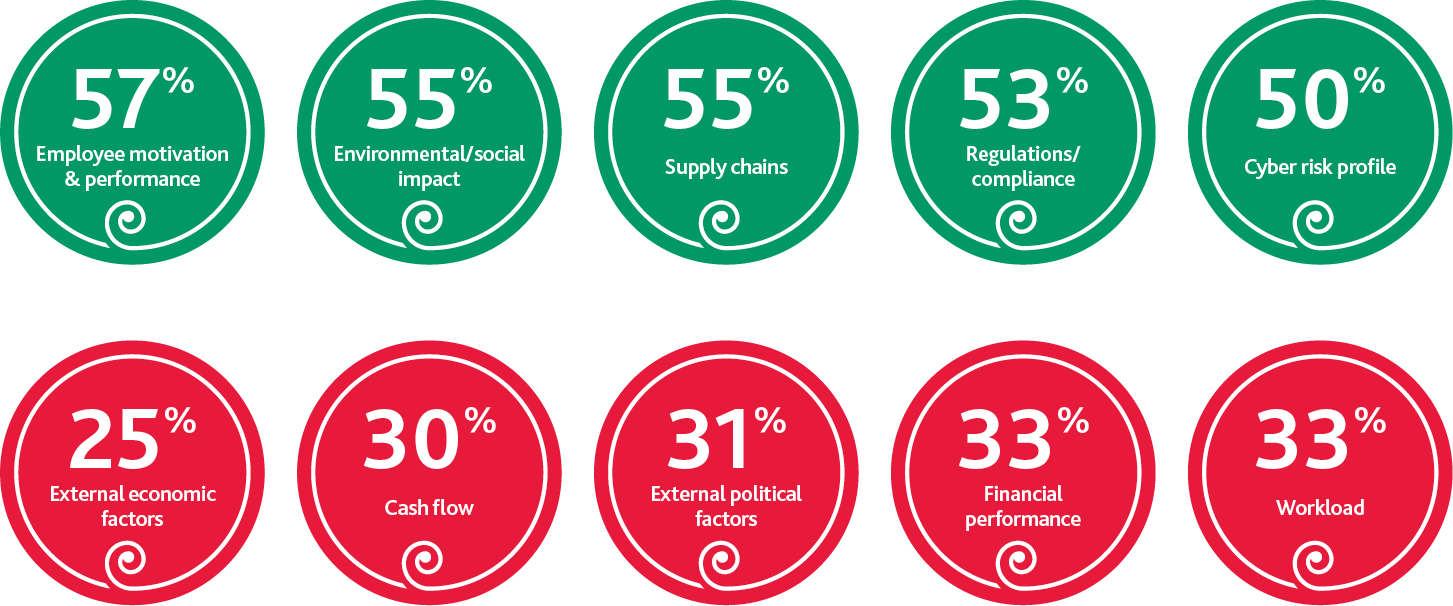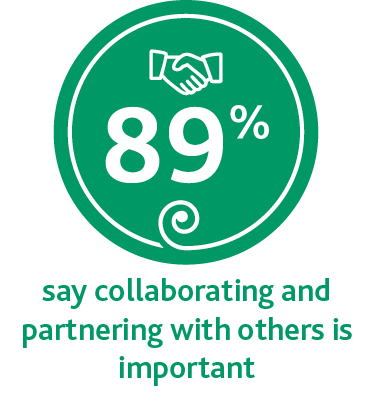
Angela Edwards
Foreword
Tēnā koutou. Kaha Ake Tātou Kotahi - Stronger Together - our sixth edition of BDO Pūrongo Pakihi Māori, the BDO Māori Business Sector Report - shares insights from Māori business leaders across Aotearoa.
Based on a survey of more than 150 Māori business leaders across the country, our report aims to shed light on the Māori business sector and provide a voice from an audience that is not often researched, yet occupies a unique place in New Zealand’s business landscape. Most importantly, the report shares practical tips to help Māori business leaders navigate their most pressing barriers.
Key report findings
Business leaders across Aotearoa continue to face economic challenges, and the duration of this downturn continues to be a key topic of discussion. What our 2024 report shows us is that while there are several priority concerns facing Māori business leaders, there is also optimism about the road ahead.
Our report highlights four main themes drawn from our survey: business and finances, collaborating and partnering, people and purpose, and wellbeing. Through these themes, we explore the challenges and opportunities faced by the Māori business community, now and in the future.
The most pressing of these challenges is the economy. High interest rates, inflation, and cost of living concerns are all creating greater pressure for Māori business leaders. Our recent BDO Business Wellbeing Index shows Māori business leaders are not alone in this, with economic factors and financial challenges driving negative sentiment for all New Zealand business leaders.
However, Māori business leaders are driven by more than just profit. Our report shows purpose is a key driver for the sector, with success measured in terms of happy and well whānau. Similarly, Māori business leaders place huge importance on partnering and collaborating with others to achieve their business goals – and with our current challenging economic context, now is an opportunity for leaders to remember we are together.
Stronger together
At BDO, we’re proud to support the Māori business sector with the advisory services we provide across Aotearoa New Zealand, supported by our BDO Pakihi Māori rōpū (group). I want to thank the Māori business leaders who generously contributed their time to this survey. We hope our report is beneficial to the sector and everyone striving for its success – and in particular, we hope our dedicated tohutohu (tips) section provides practical and actionable guidance to help Māori business leaders achieve more.
Nāu te rourou, nāku te rourou, ka ora ai te iwi.
Angela Edwards, Ngāpuhi-Nui-Tonu, BDO Māori Business Sector Leader

Watch our video below to learn more about the challenges and opportunities facing Māori business leaders currently - and get practical tips to help navigate the current conditions. Journalist Mike McRoberts joins Angela Edwards, BDO Māori Business Sector Leader, and Solomon Dalton, BDO Māori Business Advisory Partner, for a kōrero. |
Māori business leaders feel less positive than ever about their business performance
Like many across the motu, Māori business leaders are being challenged by New Zealand’s current business conditions, especially economic factors such as high interest rates, inflation, and cost of living concerns.
“It’s no surprise that Māori business leaders are finding business conditions challenging. The economic and political climate and cost of living crunch are putting pressure on businesses all over the motu, and Māori business leaders are not exempt from this.” – Angela Edwards, BDO Māori Business Sector Leader
Just 48% of Māori business leaders are feeling positive about their overall business performance right now, which is the lowest score for this metric since we started measuring it in 2022. The drivers of this are clear. When considering 17 different business performance metrics, Māori business leaders were feeling least positive about economic factors, cash flow and financial performance, political factors, and workload.
These financial and economic pressures present a challenge for Māori business leaders, who tend to be more comfortable working toward long-term visions and goals - more than a quarter of our survey respondents plan 6-30+ years ahead. When the economy is sluggish and financial pressures take hold, it becomes essential for pakihi Māori to focus more on their short-term financial and performance benchmarks.
Business performance metrics Māori business leaders feel most and least positive about

% feeling positive (all or most of the time) in the past two weeks.
While the business landscape is challenging for Māori business leaders, there is some hope ahead. 63% of Māori business leaders expect to feel positive about their overall business performance in six months’ time, which is a significant improvement from the 48% who feel positive right now.
More positivity can be found when focusing in on Māori business leaders from businesses that are more than 50% Māori-owned. Of this group, 62% feel positive about their current overall business performance and 47% feel positive about their current financial performance. This sentiment is considerably more positive than that of the wider survey group, where 48% feel positive about their overall business performance and 33% feel positive about their financial performance.
Business leaders from predominantly Māori-owned businesses may be feeling more positive due to their business’ alignment with their cultural identity. They may also experience a stronger sense of community and whānau

He rau ringa e oti ai
Many hands make light work
Working together comes naturally to Māori business leaders, which is reflected in our survey. 89% of Māori business leaders say it’s important to collaborate and partner with others when it comes to achieving their business goals. This theme of collaboration is something we’ve seen come through in previous Māori Business Sector Reports and seeking the support of others is perhaps more important than ever given the current challenging business environment.
 As economic and financial pressures take hold, Māori businesses may not have the capacity to recruit new staff. In line with this, many Māori business leaders say there are skills lacking in their organisation currently. The specific skills that are most lacking include creativity (31%) and experience (31%). This makes collaborating and partnering even more important for many Māori businesses to bring in new pūkenga (skills) – along with a continued focus on training and upskilling existing staff.
As economic and financial pressures take hold, Māori businesses may not have the capacity to recruit new staff. In line with this, many Māori business leaders say there are skills lacking in their organisation currently. The specific skills that are most lacking include creativity (31%) and experience (31%). This makes collaborating and partnering even more important for many Māori businesses to bring in new pūkenga (skills) – along with a continued focus on training and upskilling existing staff.
| “When times are tough, we see more people collaborating - working together to meet common outcomes. Where there are skills shortages across pakihi Māori, collaboration is a great way for organisations to share some of their mātauranga (knowledge) and skill sets they have in their own organisations with others. We are stronger together and collaborating and partnering with others is a great way to achieve more.” – Angela Edwards, BDO Māori Business Sector Leader |
Collaboration is also important from a wellbeing perspective. 55% of Māori business leaders say that not having enough people to rely on for support negatively impacts their mental health. It can feel lonely as a business leader, and this can intensify when budgets are tight, and workloads are high - but Māori business leaders don’t have to go it alone. Business networks, fellow business leaders, professional service providers, friends, and whānau can all help to support and guide Māori business leaders to navigate challenges and achieve goals.

He aha te mea nui o te ao? He tāngata, he tāngata, he tāngata
What is the most important thing in the world? It is people, it is people, it is people.
Māori business leaders’ kaupapa matua (main purpose) is about the people. When asked how they measure success for their business or organisation, 61% of our survey respondents said it was by having a happy and well whānau – even more important than financial performance (60%) and having an engaged team (50%). This prioritisation appears to be working – when asked which business performance metrics they’ve felt positive about in the last two weeks, 57% of Māori business leaders said they were happy with their employee motivation and performance – the highest score out of 17 different metrics.
Māori business leaders also feel positive about their environmental and social impact on their communities. This sector prioritises people, not just now but in the future – Māori businesses are known for having multi-generational strategies, putting community and cultural impacts at the heart of their organisations and building whanaungatanga – kinship and connection.
How Māori business leaders measure success for their business or organisation
39% of Māori business leaders consider the primary purpose of their business to be a combination of purpose (cultural, social, and environmental) and profit (asset growth). 24% consider their primary business purpose to be purpose alone, followed by employment at 19%, and profit at 18%. The focus on purpose reflects what we’ve seen in previous BDO Māori Business Sector Reports, and what we know about the sector in general. While many organisations tend to put profit first, Māori businesses always look to balance people, planet, and profit, understanding that all three must work harmoniously to make a successful business.
| “For Māori business leaders, it’s not just about profit – it’s about kaupapa, making an impact on your community, and making mokopuna decisions. Our business whānau are often more interested in leaving a lasting legacy, not just making pūtea (money).” – Solomon Dalton, BDO Māori Business Advisory Partner |

He taonga te hauora
Health is wealth
As business performance and financial sentiments have declined for Māori business leaders, so too has mental wellbeing. The WHO-5 score (the World Health Organisation's internationally recognised measure of wellbeing over the past two weeks) for Māori business leaders has declined from 70 in March 2024 to 64 in our most recent survey, reaching one of its lowest measures since we started tracking this metric in May 2022.
The leading cause of this negative wellbeing is business financial challenges, with 67% of business leaders who have been feeling less mentally healthy than usual saying business financial performance and cash flow problems are driving this. Additionally, 55% say that feeling like they don’t have enough people to rely on for support is having a negative impact on their mental health.
Unfortunately, this sentiment continues into the future, with just 46% of Māori business leaders saying they expect to feel generally satisfied with life all or most of the time in six months – a big drop from 67% in March 2024. As economic and financial pressures continue to impact business leaders, workloads are becoming a concern for many, and it’s more important than ever for Māori business leaders to look after their own hauora (wellbeing), as well as that of their colleagues and whānau.
| “There are several factors that are contributing to the decline in Māori business leaders’ wellbeing we’re seeing in our survey, the first being business financial performance. What’s perhaps even more concerning is that these leaders are feeling like they don’t have enough people to rely on for support. It’s so important for our business whānau to stay connected and lean on each other when times are tough” – Solomon Dalton, BDO Māori Business Advisory Partner |
More positively, Māori business leaders are taking action to help stay mentally healthy, with 64% saying they prioritise socialising with friends and family and 52% getting regular exercise to boost their mental wellbeing. At work, Māori business leaders look after their mental health by adopting flexible work practices and managing boundaries.
